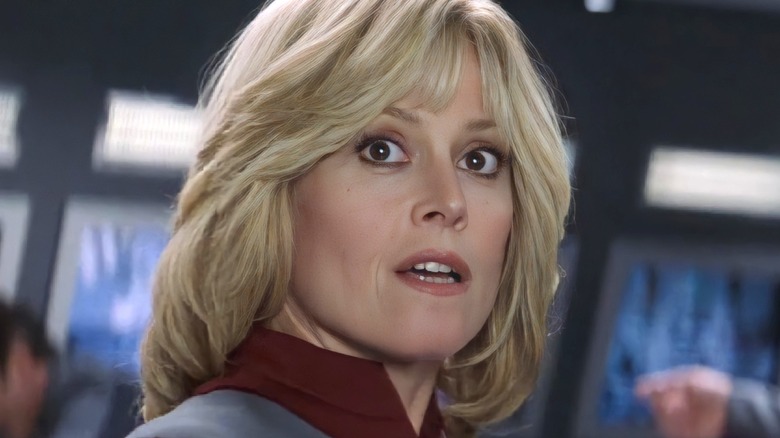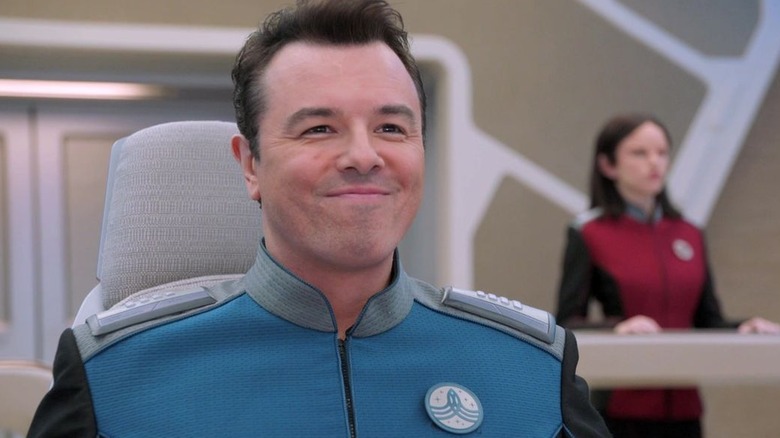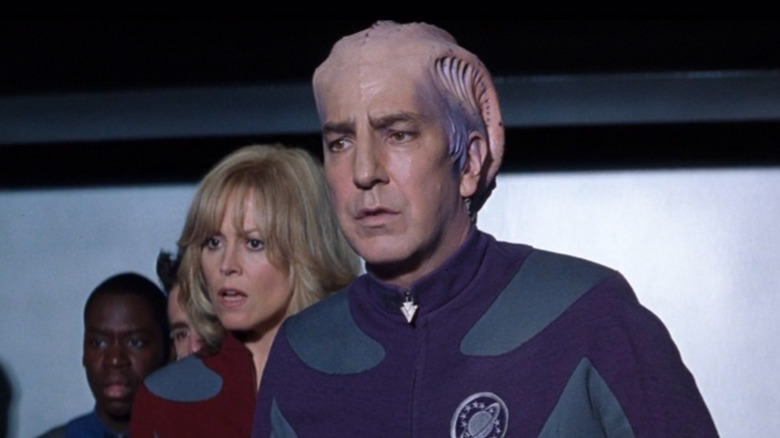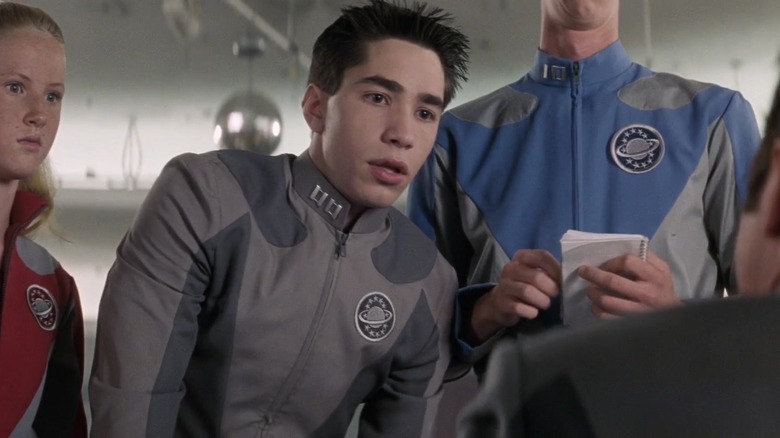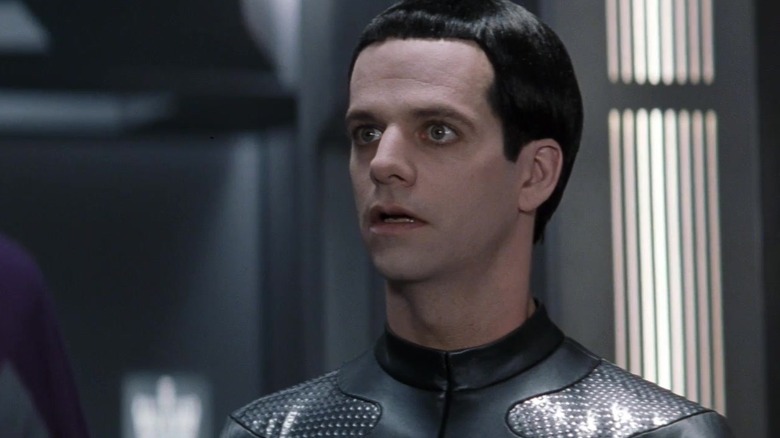Galaxy Quest's Plot Was Sequel-Proof, & The TV Revival Will Just Be An Orville Clone
For years, TV and film have been rife with reboots, and rumors have been circulating over the past few years of a television series based on the 1999 sci-fi spoof "Galaxy Quest." The film featured a veritable murderer's row of comedic and dramatic acting talent of the era, including Sigourney Weaver, Tim Allen, Alan Rickman, Tony Shalhoub, and Sam Rockwell, with a premise that lives in a universe halfway between parody and tribute. In the original "Galaxy Quest," the main characters play the cast of a long-since canceled "Star Trek"-esque series: suddenly, they are mistaken for a real spacefaring crew by an alien race known as the Thermians, and enlisted on a real space adventure. The cast rises to the daunting challenge presented to them, defeating a sadistic enemy known as Sarris and saving the universe from destruction with mere seconds to spare.
But in the process, their true identities as the cast of a television show are revealed, making the film's core premise unable to be replicated for any subsequent "Galaxy Quest" projects.
The conceit that sits at the heart of "Galaxy Quest" makes it, simultaneously, both a homage and a lambasting of nerd culture. But without a universe full of alien beings under the same mistaken impression as the Thermians — that Weaver, Allen, and their co-stars are a real band of space heroes — a potential "Galaxy Quest" series becomes just a silly "Star Trek" knockoff, a concept which has already been executed artfully by "The Orville."
The Orville already offers a more faithful tribute to the original Star Trek
Seth MacFarlane's "The Orville," while sometimes compared to "Galaxy Quest," is a series that leans far closer to the moralistic tone of the original "Star Trek" series. Sure, the MacFarlane series offers its share of funny moments, but it also — particularly in its later phases — tackles serious societal issues like racism, sexism, and LGBTQ relationships, topics that "Galaxy Quest" never comes within light years of touching.
MacFarlane admits to having seen "Galaxy Quest," but claims "The Orville" was in no way influenced by the film that is certainly a close spiritual cousin to his short-lived series. In fact, he told Digital Spy that he felt the more serious tone of "The Orville" should make it evident that he was not at all influenced by "Galaxy Quest," explaining, "The intent of that movie, to me, was to be a full-on comedy." He added, "So it really wasn't something that [inspired me]. Shockingly, I don't know the movie that well. I saw it once years ago, But it wasn't really an influence."
MacFarlane's denials aside, returning a "Galaxy Quest" series to the same universe as the original film without the original premise in place would eliminate any remaining gap between "Galaxy Quest" and "The Orville," merging their parallel lines into a single blurry stripe. And this presents a problem, because for a potential "Galaxy Quest" series, the fight to distinguish itself from "The Orville" should not be the prime directive.
A Galaxy Quest series has other narrative challenges to address
Breaking away from the original film's premise is hardly the only major challenge facing the creators of an erstwhile "Galaxy Quest" series. An obvious hurdle is finding an actor to fill the mighty void left by Alan Rickman, who died of pancreatic cancer in 2016. His character, Dr. Lazarus, was an analog to legendary "Star Trek" character Mr. Spock (Leonard Nimoy).
The primary villain from the film, Fatu-Krey General Roth'h'ar Sarris — who was named after New York Times film critic Andrew Sarris — was killed in the film, leaving another huge void in the role of primary antagonist. While it wouldn't be out of the realm of possibility for whichever studio is eventually tasked with bringing "Galaxy Quest" back to create another sadistic anthropomorphic bug-lizard villain, Sarris was perfectly executed by the special and practical effects teams and actor Robin Sachs. Replicating his unique brand of intimidation would thus present another troublesome challenge — because, sure, without being able to use the film's original premise or main villain, the writers of a "Galaxy Quest" series could reach back in time and mine the many scripts of the various "Star Trek" series for storylines and antagonists, but these wells would soon run dry. Taking this route would leave the "Galaxy Quest" series as short-lived as a red-shirted "Star Trek" guest actor.
The progression of time presents yet another challenge for the Galaxy Quest continuation
Time has also marched on for nearly a quarter century since "Galaxy Quest" was released, dragging its cast along with it. Tim Allen is now 70, Sigourney Weaver is 73, Tony Shalhoub turns 70 in October, and Sam Rockwell is 54. While Alan Rickman is the only main cast member who has died since the film's release, everyone else has aged a generation since, and if any of them are recast in the same roles, this will have to be somehow addressed. The most noticeable change would be in Justin Long, who was just 21 when he made his acting debut in "Galaxy Quest" and turned 45 this past June. But dealing with aging actors might be among the easier challenges for the creators of a "Galaxy Quest" series. A more difficult task will be to regenerate what one legendary creative force regards as cinematic perfection.
In his 2007 book "Bambi vs. Godzilla," playwright and filmmaker David Mamet listed "Galaxy Quest" as one of only four perfect films. ("The Godfather," "A Place in the Sun," and "Dodsworth" were the others.) Recreating that perfection in a TV series means somehow finding a way to instill the wonderment felt by the Thermians when they come to Earth and meet their heroes at the Questarian convention depicted in the film's opening scenes.
Creators of a Galaxy Quest series must also solve the Quellek Conundrum
That aforementioned awe is felt most deeply by a Thermian named Quellek (Patrick Breen), who reveres Dr. Lazarus and dies during the climactic battle with the Fatu-Krey. Quellek epitomizes the naïvete of the Thermians, as well as the wide-eyed wonder of the fans who have made "Galaxy Quest" an enduring cult hit. With his death in the film, Quellek can't be brought back in a subsequent series, leaving the symbolic torch-carrying to another character. The icon for the fans' reverence was Justin Long's Brandon, but Long has aged far beyond his innocent boyhood years. The original "Galaxy Quest" film was also a perfect storm of masterful performances by actors at their peak and the right director being placed in the project at the right time.
Harold Ramis was originally slated to direct, but Dean Parisot was brought on midway through shooting. He and producer Mark Johnson wove an enduring tapestry of cinematic magic. And today, it's impossible to imagine recreating the fortuitous set of circumstances that came together to create one of David Mamet's four perfect films.
Indeed, if the result is only going to be a lesser version of "The Orville," then perhaps the false starts are a sign that a "Galaxy Quest" series is just not meant to be.
